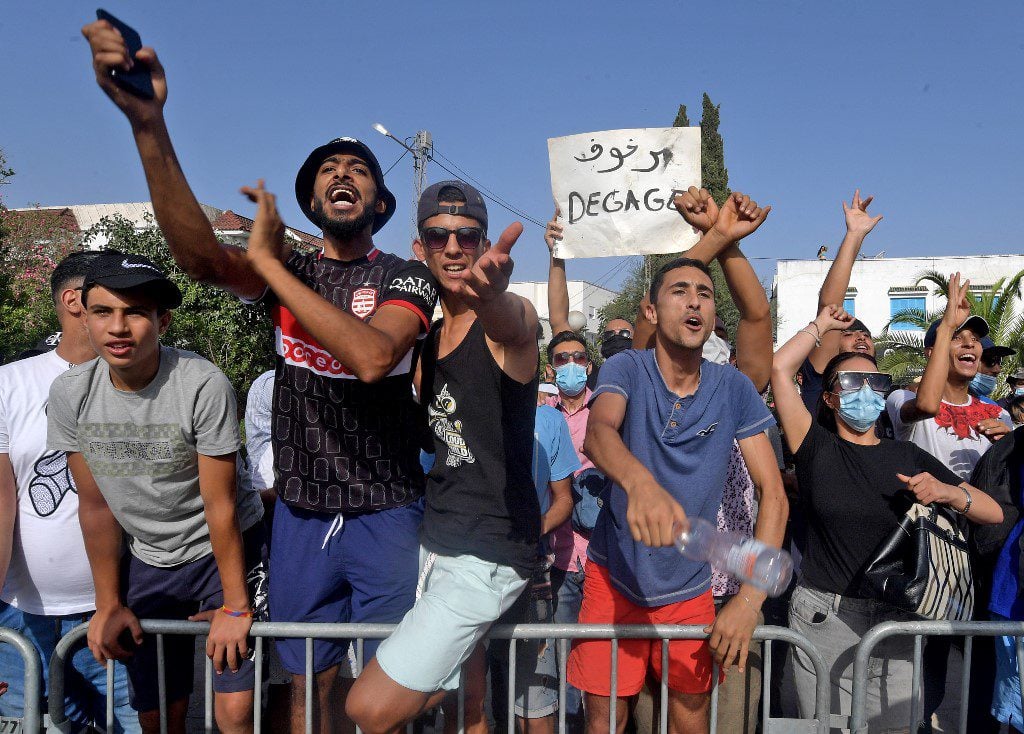
Hakim Marzouki
A couple of days ago, Tunisian President Kais Saied suspended the Parliament and dismissed Prime Minister Hisham Al-Mishishi. This step was rejoiced by most Tunisians. The president is now presiding over the executive authority until the appointment of a government. They considered it a response to legitimate public demands amid stifling economic, social, and epidemiological crises.
Crowds in Tunisia are still celebrating in the streets and squares. The Tunisians consider what happened a victory for democracy and the will of the people. All Tunisians felt that except the Islamists. Those deem the matter as a coup, even though the step of Said is based on Article 80 of the 2014 constitution.
This pivotal event, which occurred very peacefully and smoothly without any clash or shedding a single drop of blood, is not new to this country, the cradle of the Arab Spring, the origin of the Jasmine Revolution. Countries like Libya, Egypt, Syria, and Yemen tried to follow the Tunisian example. However, these countries suffered from imprisonments, killings, displacement, conflicts, and clashes.
What is the secret of this strange peacefulness that featured the history of a country that is inseparable from its Arab and Islamic sphere, and what gave it this exception?
Anyone who contemplates Tunisia’s modern history will notice that all significant political changes occur suddenly, quickly, and smoothly, which we do not find in the countries of the Arab region. And most of them are free of violence and blood. These political changes usually lean on a constitutional chapter – or even a legal loophole – that gives legitimacy, thus securing the approval and blessing of people.
On July 25, 1957, the leader of the independent state, Habib Bourguiba, declared the republic after Tunisia was a kingdom ruled by the Ottoman beys. The transition to the republic was like a protocol; peaceful and elegant, without shedding a single drop of blood.
Even the achievement of independence in 1956 came after a negotiating marathon, not a revolution that claimed hundreds of thousands of lives. Unlike what happened in Algeria, the western neighbour whose events were marred by the blood during and after Algerian War and what is known as the black decade (Algerian Civil War).
The strange irony is that it became a French protectorate in 1881 after the Treaty of Bardo without any clash mentioned as if it was an inevitable fate.
Nowadays, the Parliament is in this suburb. And in the past, Bardo was the palace of the bey ruler of the country. The suburb took its name from the famous acquiescence treaty in which French colonialism started. It contains the most well-known museum containing a mosaic collection that is considered the biggest in the world. This suburb did not know blood until the terrorist attack in 2015 that killed 22 foreign tourists.
Bardo Square also witnessed what was known as the Departure Sit-in, which forced the Ennahda government in 2013 towards elections after the assassination of the leftist activist Chokri Belaid.
These peaceful transitions that marked Tunisia’s political history include the deposing of Bourguiba in 1987 by Ben Ali, who, in turn, was overthrown in 2011 following a successful revolution with minimal losses.
When we look for the secret of this peacefulness, we find that the most prominent indicator is the military institution that Bourguiba made sure it would remain behind the walls of the barracks and never interfere in politics, which earned it respect and trust among the Tunisian people.
Besides, the level of social awareness that has been established thanks to the independent state’s bet on education and culture, despite becoming a minor problem in the light of the unemployment among high degrees holders.
DISCLAIMER
The opinions expressed in this publication are those of our bloggers. They do not purport to reflect the opinions or views of Fanack or its Board of Editors.


